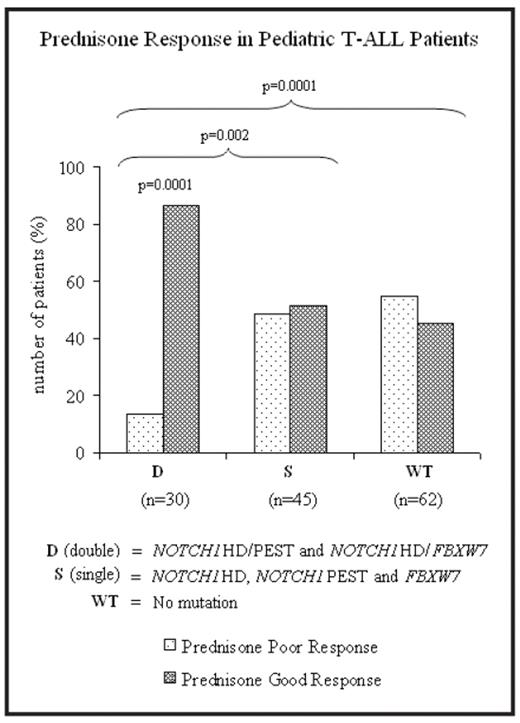Abstract
In contrast to pre B-ALL, robust DNA-based biomarkers with prognostic and predictive value are not available in T-ALL. We have previously shown that common activating mutations of the NOTCH1 receptor predict good early treatment response and excellent long term outcome in T-ALL (Breit et al., Blood 2006). We now aimed at analyzing if recently described inactivating mutations of FBXW7, the E3 ubiquitin ligase of NOTCH, contribute to the predictive power of the Notch1 pathway activation in pediatric T-ALL.
We genotyped FBXW7 in 137 T-ALL and found inactivating mutations in 22 patients. We next analyzed the influence of this mutation on treatment response and found that most patients with FBXW7 mutations showed a prednisone good response (PGR; 19/22), whereas PGR was observed in only 58/115 with no FBWX7 mutation (p=0.0006). This beneficial effect of FBXW7 inactivating mutations is enhanced when the NOTCH1 mutational status was considered. Among 17 patients with NOTCH1 and FBXW7 mutations, only 1 showed a prednisone poor response (PPR; p=0.0003). These results suggest a synergistic effect of NOTCH1 and FBXW7 mutations in early treatment response in pediatric T-ALL.
Notably, FBXW7 mutations occur in the group of leukemias with NOTCH1 heterodimerisation (HD) domain mutations only and do not occur in those with truncations of the PEST domain, where FBXW7 physiologically targets NOTCH for degradation. One might thus predict that patients with NOTCH1-HD/PEST double mutations would be biologically similar to those with NOTCH1-HD/FBXW7 double mutations. A comparison of early treatment response between these groups indeed showed PGR in 10/13 patients with NOTCH1-HD/PEST and 16/17 with NOTCH1-HD/FBXW7 status. Furthermore, these groups taken together exhibit a significantly better prednisone response than both, the patients with single mutations in either NOTCH1 or in FBXW7 or those with detectable mutations in neither NOTCH1 nor FBWX7 (see bar diagram).
These data indicate that activation of the Notch1 pathway by a combination of receptor gain of function mutations and inactivating mutations of its E3 ubiquitin ligase has a strong favorable effect on in-vivo prednisone sensitivity. Notch pathway activation may thus define a novel group of biomarkers that predict early treatment response and thus help to stratify risk of children and adolescents with T-ALL.
Disclosures: No relevant conflicts of interest to declare.
Author notes
Corresponding author


This feature is available to Subscribers Only
Sign In or Create an Account Close Modal